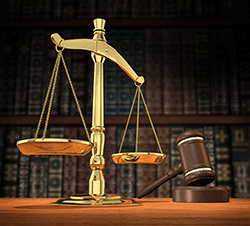Arizona Criminal Court Records Search
Arizona's criminal court system is designed to handle a wide range of criminal cases, from minor infractions to serious felonies. This article provides a comprehensive overview of the various courts and divisions that deal with criminal matters, the types of cases they handle, how to conduct an AZ criminal court case search, and the steps to expunge a criminal conviction in Arizona.
Arizona Criminal Court Structure
Arizona's court system is structured into several levels to address criminal cases based on their severity. Here is an outline and description of each division of the AZ criminal court structure:
Municipal Courts (City Courts): Handle misdemeanors, traffic violations, and city ordinance infractions occurring within city limits. These courts usually handle less severe criminal cases such as shoplifting or public intoxication.
Justice Courts: This division hears criminal cases that deal with misdemeanors, as well as preliminary hearings for felony cases, and civil violations. Justice Courts also handle cases in rural areas or unincorporated parts of the state.
Superior Courts: Serve as the trial courts for more serious criminal matters, including felonies and appeals from Municipal and Justice divisions. Each county in the state has at least one Superior Court.
Arizona Court of Appeals: Reviews cases appealed from the Superior Court, focusing on legal errors rather than re-evaluating evidence.
- Arizona Supreme Court: The state’s highest court, which hears appeals from the Court of Appeals and cases of statewide importance.
Types of Criminal Cases
Criminal cases in Arizona are categorized into three primary types. Each of these types have varying degrees of punishments, with felonies being the most serious. Here is a breakdown of these types:
Infractions: Minor offenses such as parking violations or jaywalking. Infractions typically result in fines and do not carry jail time.
Misdemeanors: Crimes punishable by up to six months in jail and/or fines. Examples include DUI (first offense), petty theft, and simple assault.
- Felonies: Serious crimes that can result in prison sentences longer than one year. Felony offenses include aggravated assault, drug trafficking, and murder. Felonies are further classified into six categories, ranging from Class 1 (most severe) to Class 6 (least severe).
How to Conduct an Arizona Criminal Court Case Search
Individuals seeking information on criminal cases in Arizona can access public court records through the following methods. Results may include criminal case proceedings, outcomes and convictions, incarcerations, active warrants, and probation orders.
Arizona Judicial Branch’s Public Access to Court Information Website: This online portal allows users to search for case details using a name, case number, or citation number.
County Clerk of the Superior Court: Contact the Clerk’s Office in the county where the case was filed to request records in person or by mail. For example, if you want to access criminal records in Pima County, you can contact the Clerk from the Pima Superior Courthouse.
- Municipal and Justice Courts: Visit the specific court’s website or office for records related to misdemeanors or infractions.
It is important to note that some records, such as juvenile cases or sealed documents, may not be publicly accessible.
Expunging a Criminal Conviction in Arizona
Expungement (or "setting aside" a conviction, as it is known in Arizona) is a legal process that removes certain criminal convictions from a person’s record, offering a fresh start. The steps include:
Eligibility Assessment: Review your case to determine if it qualifies for expungement. Most misdemeanors and some felonies are eligible, provided you’ve completed all sentencing requirements.
Filing a Petition: Submit a "Motion to Set Aside" to the court that handled your case. This involves completing the appropriate forms and providing evidence of rehabilitation, such as employment or community involvement.
Court Review: The court will review the motion and may hold a hearing to evaluate your request. Prosecutors and victims may also provide input during this process.
- Decision: If approved, the court will issue an order to set aside the conviction. While the record remains visible, it will show that the conviction was vacated, which can improve opportunities for housing, employment, and other areas of life.
Conclusion
Arizona's criminal courts are a necessary of the criminal justice system, while providing avenues for rehabilitation and redress. By understanding the court structure, case types, and processes, anyone in the public can effectively navigate the legal system more efficiently. Whether conducting a case search or pursuing an expungement, resources are available to help citizens address their legal concerns and move forward with their lives.


